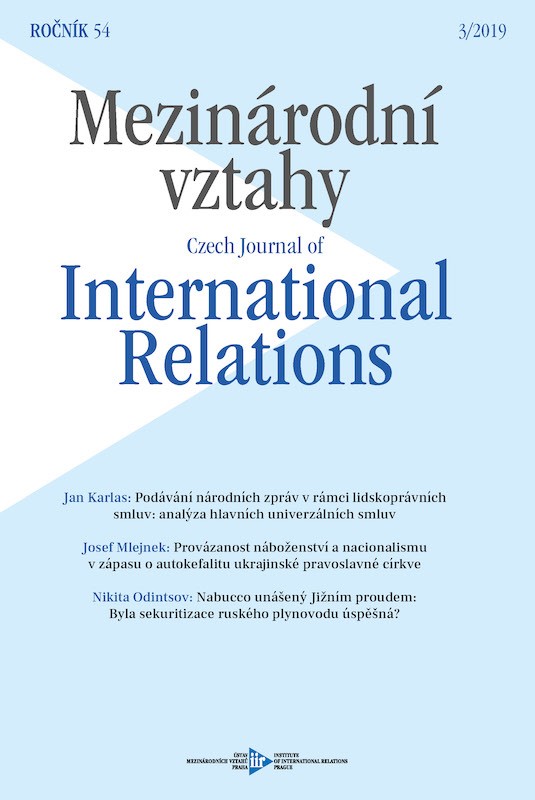New issue of Czech Journal of International Relations (Vol 54, No 3) is out!
We are pleased to announce that a new issue of Czech Journal of International Relations, Vol 54, No 3 has just been published.
Czech Journal of International Relations, Vol 54, No 3 includes three original research articles that focus monitoring of the implementation of universal human rights treaties, the struggle for an autocephalous status for Ukrainian Orthodoxy, and analysis of European Commission’s attempt for the securitization of the Russian South Stream pipeline. A full text of the issue is available in Czech language only.
The first article, National Reporting in the Framework of Human Rights Treaties: Analysis of the Core Universal Treaties, written by Jan Karlas, aims to examine the implementation of universal human rights treaties. Based on unique empirical analysis of available reports, the author reveals main reasons which lead to occurrence of differences in national implementation reports among particular regions.
Josef Mlejnek, author of the research article called The Intertwining of Religion and Nationalism in the Struggle for an Autocephalous Status for Ukrainian Orthodoxy, describes in the ideological basis of the conflict over the autocephaly of Ukrainian Orthodoxy. He specifically interprets it as a clash of two historical-religious mythologies, which serve as an example of intertwining of religion and nationalism. These mythologies have the potential to significantly shape not only the ecclesiastical or religious scene of Ukraine and the Russian Federation, but also the concepts of national identity and value attitudes of inhabitants of both countries.
In the third article, Nabucco Swept Away by South Stream: Was the Securitization of the Russian Pipeline Successful?, Nikita Odintsov explores how successful the European Commission was in the securitization of the Russian South Stream pipeline. The study shows that the participating countries did not recognize Russia or the South Stream pipeline as a threat to the security of supplies. Instead, they were using their alternative discourses in order to resist this securitization.
The new book reviews in this issue are:
- Sachs, Jeffrey D.: A new Foreign Policy: Beyond American Exceptionalism (review written by Michal Bula)
- Karel Černý: Velká blízkovýchodní nestabilita: Arabské jaro, porevoluční chaos a nerovnoměrná modernizace 1950-2015 (review written by Lubomír Zvada)
- Václav Hubinger: Diplomatické Theatrum mundi. (review written by Petr Skalník)
- Václav Šmejkal a kol.: Evropská unie po brexitu: Právně-institucionální aspekty evropské integrace (review written by Jan Prokeš)
- Petr Sedláček: Mezinárodní měnový systém a globální finanční krize (review written by Jan Prokeš)
- Lucie Jírů: Vliv šíitského duchovenstva na politiku a společnost (review written by Karel Černý)
- Martina Ponížilová: Regionální řád a mocnosti Blízkého východu: Formování blízkovýchodního řádu na pozadí soupeření regionálních mocností v letech 1945-2015 (review written by Radka Havlová)
